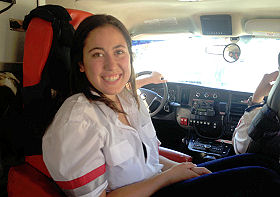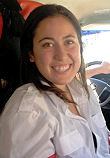THE MOST AMAZING EXPERIENCE OF MY LIFE!
There is no other way to put it, volunteering on ambulances is like an addictive drug. For some reason, despite having to wake up at 5:45am, despite hours of twiddling my thumbs at the station, and despite countless transfers from one hospital to another, I kept coming back for shift after shift after shift, and every shift was as exciting as my first.
So basically volunteering for MDA (or ‘Mada’ as the Israelis call it) as part of the “overseas volunteers” involves a six-week program, including a ten-day intensive training course, and 5 weeks as a ‘konan’ (first responder) on ambulances around the country.
The course includes a mixture of scientific theory and practical training, with a small test at the end. However, it’s also the best way to get to know your fellow volunteers, and what better ice-breaker than back-boarding and bandaging some new American friend.
Before you arrive, you get emailed a list of 300 Hebrew medical terms and phrases for use when you are on an ambulance – so even if you can’t speak a word of Hebrew, you’ll understand when your driver says “Start CPR!” or “Heart attack!”. The course is certainly intense. You’re bombarded with a lot of information very quickly – and it’s hard to pass without studying and practising – yet it was still one of my favourite weeks after 6 months in Israel. And the best part is that the course was only the start of the most amazing experience of my life.
After the course, you are “plutzing” to start your first shift, to get your first CPR, your first car accident, your first heart attack. And inevitably, chances are that your first call will be some old guy who fell in his apartment and needs a couple of bandaids. Or worse! The dreaded “avara” (transfer call), where your assistance is not needed at all to simply drive a patient from one hospital to another.
My first “mishmeret” (shift) was really tough. I had zero idea how an ambulance worked or how a station worked and, of course, everything you learn in training goes out the window once you are really on call. During my first week. I tried to take blood pressure on someone’s arm, forgetting of course that that particular shoulder happened to be dislocated – ouch! But after about 3 or 4 shifts, you find your place on the ambulance, you get used to the language, you know what your role is from “nesiah” (call) to “nesiah” and you find yourself cracking jokes with the patients and ambulance team.
Your role as a “konan” (first responder) is more or less to be your driver’s personal assistant (the drivers being trained medics and senior medics). You take blood pressure, pulse, count breaths, inspect for signs of trauma injuries, fill out the forms, comfort the patient, pretend you understand what the patient is saying and nod with a calm smile on your face.
The craziest call I’ve had so far was for an American tourist who fell from the fourth floor of her building trying to jump balconies. When we arrived, she was thankfully fully conscious despite us being able to see her jaw bone through her skin. Finally my language came in handy, and I was lucky to be the one translating and asking her all the necessary questions for a trauma patient. After the standard “bdeikot” (checks) in the ambulance, she was rushed straight into the trauma and shock emergency room where we got to witness her being prepared for emergency surgery.
 Volunteering with MDA has been, without a doubt, the most amazing experience I have had in Israel so far.
Volunteering with MDA has been, without a doubt, the most amazing experience I have had in Israel so far.
It not only gives you first hand medical experience, but gives you a fantastic insight into Israeli lifestyle and culture. What better way to get to know the people and language than being thrown straight into Israeli residences and public areas, immersed within the lifestyle and Israeli way of thinking first hand? Yes, by volunteering you are helping MDA and Israel immensely, but you gain as much as you give. And of course we know, “whoever has saved one life has saved an entire world”.
 Zoe Diamond
Zoe Diamond Zoe Diamond
Zoe Diamond